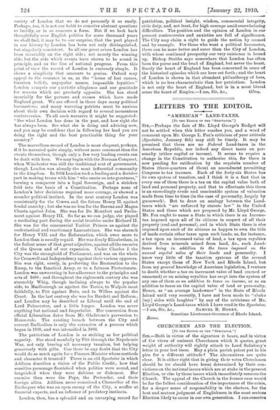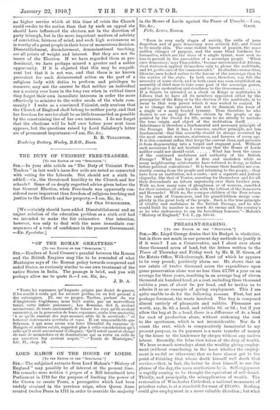CHURCHMEN AND THE ELECTION.
[To THE EDITOR OP THE " SPECTATOR."1
STR,—Both in virtue of the signature it bears, and in virtue of the views of eminent Churchmen which it quotes, great weight of authority will rightly attach to Lord Salisbury's letter in your last issue. May a plain parish priest put in his plea for a different attitude P The alternatives are quite clear. It is either right that in giving their votes Churchmen should be (or should have been) determined by their con- victions on the national issues which are at stake in the present Election, or else by those issues which immediately concern the Church. The appeal of the Church in the former case would be for the fullest consideration of the importance of the crisis, for a deeper sense of responsibility in the electors, for the best and mature judgment of Englishmen in the most serious Election likely to occur in our own generation. I can conceive
no higher service which at this time of crisis the Church could render to the nation than that by such an appeal she should have influenced the electors, not in the direction of party triumph, but in the more important matters of sobriety of conviction, fairness of mind, and such high seriousness as is worthy of a great people in their hour of momentous decision. Disestablishment, disendowment, denominational teaching, are all points of weight and interest. But they are not the issues of the Election. If we have regarded them as pre- dominant•, we have perhaps missed a greater and a nobler opportunity. If it is objected that this may be magnifi- cent but that it is not war, and that there is no known precedent for such disinterested action on the part of a religious body with duties to perform and privileges to conserve, may not the answer be that neither an individual nor a society ever loses in the long run when in critical times they forget their own immediate interests in order the more effectively to minister to the wider needs of the whole com- munity ? I write as a convinced Unionist, only anxious that the Church of England shall belong to neither party, and that her freedom for service shall be as little trammelled as possible by the constraining ties of her own interests. I do not forget that the elections will be half over before your next issue appears, but the questions raised by Lord Salisbury's letter are of permanent importance.—I am, Sir, &c.,







































 Previous page
Previous page